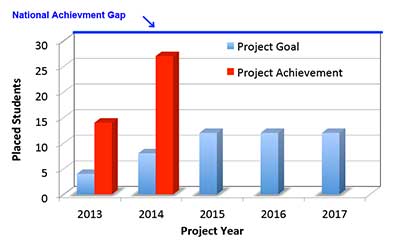Director’s Corner
Ted Hodapp, APS Director of Education and Diversity
As you have undoubtedly heard, the APS formally changed the organizational structure of its Council and Board over the past year, with a formal vote in November that established a new “Board of Directors” that manages financial decisions and strategic planning, and a “Council of Representatives” that oversees physics policy concerns, awards, and programmatic endeavors.
While the details of how these changes will impact APS education and diversity initiatives is still being fleshed out, I am happy to report that the Council and Board approved establishing a new initiative at its November meeting: Building a National Mentoring Community (NMC), which will work to increase the number and fraction of underrepresented minority students who receive undergraduate degrees in physics. The NMC will host its first gathering in October 2015, and provide travel support to bring together mentors and their mentees to provide professional development for students, and support and improve mentoring throughout the physics community. If you know of an individual who you think would make an excellent mentor of an underrepresented minority student, please contact me (hodapp@aps.org), as we will be contacting the first prospective mentors very soon. More details will be available early in 2015.
APS, in collaboration with AAPT, is proud to announce the most recent PhysTEC comprehensive site awards: West Virginia University, Rowan University, Texas State University, and a partnership between University of Northern Colorado and Colorado School of Mines. In addition, Sonoma State University, Bowdoin College, Indiana University South Bend, East Tennessee State University, Boise State University, Salisbury University, University of Wyoming, University of Massachusetts Dartmouth, and a consortium of Oklahoma institutions led by Northwest Oklahoma State University will receive funding to improve recruiting efforts to educate more high school physics teachers. PhysTEC will be publishing its second book this spring, tentatively titled: “Recruiting and Educating Future Physics Teachers: Case Studies and Effective Practices.” The book will include more than 20 articles on effective practices that increase education of future physics teachers. And perhaps most importantly, PhysTEC, now led by Monica Plisch, is currently developing plans to expand the impact of its very successful efforts. Our goal is to lay the groundwork for solving the shortage of physics teachers by widespread implementation of best practices established by the project’s participating universities over the past decade. The results of our current efforts show this is clearly possible – now we need to broaden implementation to solve the problem nationwide. More information is available on the PhysTEC website.
APS is also moving forward to understand the concerns of physicists who identify as lesbian, gay, bisexual, transgender (LGBT) and other gender and sexual minorities. An ad hoc Committee on LGBT Issues (C-LGBT) has been formed, chaired by Professor Michael Falk (Johns Hopkins University), and will have its first in-person meeting in January. C-LGBT has been charged with providing guidance to APS policy makers on how we can make physics and the APS more inclusive to members of the LGBT community, and reduce barriers to studying and practicing physics. Like many such activities, we expect the outcomes to benefit everyone, with the result being a more welcoming environment for all. If you would like to contact the committee with thoughts or concerns, please email lgbtcontact@aps.org. In addition, a self-organized group, LGBT+ Physicists, offers more information and ways to stay connected at lgbtphysicists.org.

Disclaimer – The articles and opinion pieces found in this issue of the APS Forum on Education Newsletter are not peer refereed and represent solely the views of the authors and not necessarily the views of the APS.
